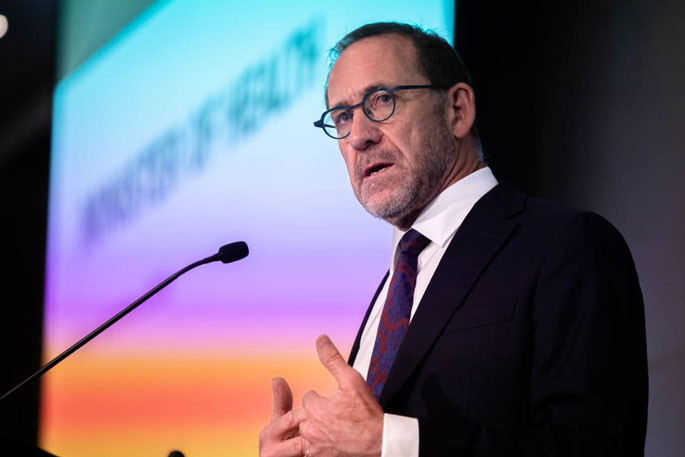About 20,000 health staff who work outside of hospitals are set to get a pay rise to bring them in line with those who do, the government has announced.
But nurses in GP clinics, who have been striking for a similar deal, are not included.
The announcement early this morning covered health staff, including nurses, who did not work in hospitals or directly for Te Whatu Ora/Health NZ or the Māori Health Authority - but whose employers had contracts with the organisations.
Aged-care facilities, hospices, homecare support and Māori and Pacific healthcare organisations will be first, because there was clear evidence that that is where the biggest pay gap is, says Health Minister Andrew Little.
"I expect these contract changes will happen in the first part of next year, follow by mental health and addiction facilities, organisations caring for the disabled and other types of residential care, and then other government-funded health services.
Many of those workplaces have been struggling to retain staff because they can't pay as much as Te Whatu Ora / Health NZ, says Little.
The boost will also help workers with cost of living pressures, he says.
 Health Minister Andrew Little. Photo: RNZ / Angus Dreaver.
Health Minister Andrew Little. Photo: RNZ / Angus Dreaver.Larger aged care providers are paying close to hospital rates but in many others - especially those owned by families or charities - the pay gap could be significant, Little told Morning Report.
Nurses working in general practices have also been fighting for pay parity in a series of short strikes this year, saying they are paid between 10 or 20 per cent less than their Te Whatu Ora counterparts.
But Little says the latest package will not immediately mean a change for GP nurses because there is no real evidence of a pay difference from data provided by Nurses Organisation and GP organisation GenPro.
"In both cases it showed that the problem in GP practices was nowhere near as acute as in those other areas, in fact in many cases for GP practices they were paying close to or at the hospital rates of pay."
That decision could change if evidence of disparity emerged in the future, he says. They will be eligible to come into the funding stream from July 1 next year.
Pay equity for hospital nurses will take longer as legal action by unions is only just getting under way.
"The Employment Relations Authority said last week they thought that it might take until July before they get the evidence they need in order for it to do its work to satisfy the request that the Nurses Organisation has made of it.
"It is going to be a long way away."
The government will make available $40 million in the remainder of this financial year and $200 million a year after that.
The funding will go directly to the organisations which hold the contracts and they will be obliged to use it to pay the staff.
'A day of celebration'
New Zealand Aged Care Association chief executive Simon Wallace told Morning Report today's announcement is an acknowledgement that aged care is a "mainstream function" of the healthcare system.
"We look after 40,000 very acute, very sick older people and we stop the public hospitals from overflowing," he says.
"This is also about aged care being recognised as a mainstream function of the health system."
He says the association is "really pleased" with today's announcement.
"It's come through a lot of hard work from a lot of people in the sector and today is a day of celebration."
He says the association has been advocating for the nurses it represents to gain pay parity with public hospital nurses for almost three years.
The jump in pay the agreement will afford nurses in the aged care sector was "significant" and he hoped it would help the sector to retain staff.
He says the current pay gap between nurses working in aged care facilities and those working in public hospitals was between $10,000 and $15,000 a year.
"That is the reason why the aged care sector has been losing nurses to public hospitals."
"For the first time, nurses choosing to work in aged care will not be penalised for doing so."
The aged care sector relied heavily on migrant workers and having migrant nurses added to the green list giving them immediate residency was something the association would also like to see happen, Wallace adds.
Fight for GP nurses to gain pay parity continues
The New Zealand Nurses Organisation is also pleased at today's agreement, but its chief executive Paul Goulter told Morning Report the fact GP nurses have not been included is a disappointment.
"We're very pleased, we've been fighting for this for a long time and it's good that the government's finally come round and promised the funding for ... this group."
Goulter says the agreement will stop the "drift out of key areas" such as aged residential care, which is what is happening currently.
"The gaps have just been so big that really they just can't ignore the bigger wages being offered by the hospitals."
However, the organisation is disappointed GP nurses have been left out.
"We - and probably the [GP nurses'] employers - will be thinking about how can we move that along."
He says some GP practices are already paying their nursing staff in line with what hospital nurses received, but in many cases those doing so were using funding that had been provided for other purposes.
"So you're essentially robbing Peter to pay Paul and that's not really sustainable in any way."



0 comments
Leave a Comment
You must be logged in to make a comment.